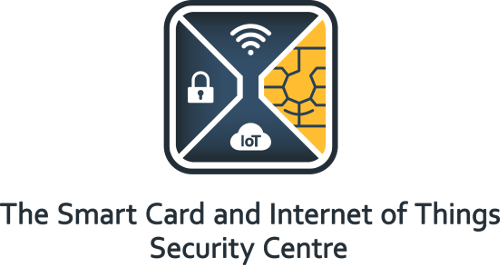Director of the Smart Card Centre
 Professor Konstantinos Markantonakis M.Sc., Ph.D., MBA (London) became the Director of the Smart Card Centre in January 2016. He received his BSc (Hons) in Computer Science from Lancaster University in 1995, his MSc in Information Security in 1996, his PhD in Smart card Security in 2000 and his MBA in International Management in 2005 from Royal Holloway, University of London. He is currently a Professor of Information Security in the Information Security Group in Royal Holloway University of London. His main research interests include smart card security and applications, secure cryptographic protocol design, key management, embedded system security and trusted execution environments, mobile phone operating systems/platform security, NFC/RFID/HCE security, grouping proofs, electronic voting protocols. He has published more than 140 papers in international conferences and journals. Since completing his PhD, he has worked as an independent consultant in a number of information security and smart card related projects. He has worked as multi-application smart card manager in VISA International EU and as a Senior Information Security Consultant for Steer Davies Gleave. He is a member of the IFIP Working Group 8.8 on Smart Cards. Since June 2014, he is vice chair of IFIP WG 11.2 Pervasive Systems Security . He continues to act as a consultant on a variety of topics including smart card security, key management, information security protocols, mobile devices, smart card migration program planning/project management for financial institutions, transport operators and technology integrators.
Professor Konstantinos Markantonakis M.Sc., Ph.D., MBA (London) became the Director of the Smart Card Centre in January 2016. He received his BSc (Hons) in Computer Science from Lancaster University in 1995, his MSc in Information Security in 1996, his PhD in Smart card Security in 2000 and his MBA in International Management in 2005 from Royal Holloway, University of London. He is currently a Professor of Information Security in the Information Security Group in Royal Holloway University of London. His main research interests include smart card security and applications, secure cryptographic protocol design, key management, embedded system security and trusted execution environments, mobile phone operating systems/platform security, NFC/RFID/HCE security, grouping proofs, electronic voting protocols. He has published more than 140 papers in international conferences and journals. Since completing his PhD, he has worked as an independent consultant in a number of information security and smart card related projects. He has worked as multi-application smart card manager in VISA International EU and as a Senior Information Security Consultant for Steer Davies Gleave. He is a member of the IFIP Working Group 8.8 on Smart Cards. Since June 2014, he is vice chair of IFIP WG 11.2 Pervasive Systems Security . He continues to act as a consultant on a variety of topics including smart card security, key management, information security protocols, mobile devices, smart card migration program planning/project management for financial institutions, transport operators and technology integrators.
E-mail: K.Markantonakis@rhul.ac.uk
Founder Director of the Smart Card Centre (now Director of ISG)
 Professor Keith Mayes (B.Sc. (Bath) Ph.D. (Bath) CEng FIET) received his BSc (Hons) in Electronic Engineering in 1983 from the University of Bath (www.bath.ac.uk), and his PhD degree in Digital Image Processing in 1987. During his first degree he was employed by Pye TVT (Philips) which designed and produced TV broadcast and studio equipment. His PhD was sponsored by Honeywell Aerospace and Defence and on completion he accepted their offer of a job. In 1988 he started work for Racal Research where he worked on a wide range of research and advanced development products and was accepted as a Chartered Engineer. In 1995 he joined Racal Messenger to continue work on a Vehicle Licence plate recognition system (Talon) and an early packet radio system (Widanet/Paknet). In 1996 Keith joined Vodafone as a Senior Manager working within the Communication Security and Advanced Development group, under Professor Michael Walker. Early work concerned advanced radio relaying systems and involved participation in international standardisation (ETSI SMG2). Later he led the Maths & Modelling team and eventually took charge of the Fraud & Security group. During this time he was training in intellectual property and licensing, culminating in membership of the Licensing Executives Society and the added responsibility for patent issues in Vodafone UK. In 2000, following some work on m-commerce and an increasing interest in Smart Cards he joined the Vodafone International organisation as the Vodafone Global SIM Card Manager, responsible for SIM card harmonisation and strategy for the Vodafone Group (www.vodafone.com). In 2002, Keith left Vodafone to set up Crisp Telecom (www.crisptele.com) and in November 2002 he was also appointed as the Director of the Smart Card Centre (www.scc.rhul.ac.uk) at Royal Holloway University of London (www.royalholloway.ac.uk), reporting to Professor Fred Piper in the world renowned Information Security Group (http://www.royalholloway.ac.uk/isg). Keith is a Founder Associate Member of the Institute of Information Security Professionals and a member of the Advisory Board for the Sensing and Security Group SIG within the London Technology Network (LTN). He has also had director experience within a London stock market listed company and a subsidiary of an American communications company. Recent high profile activity included leading the expert team that carried out counter-expertise work on the Ov-Chipkaart for the Dutch transport ministry, following published attacks on the Mifare Classic chip card.
Professor Keith Mayes (B.Sc. (Bath) Ph.D. (Bath) CEng FIET) received his BSc (Hons) in Electronic Engineering in 1983 from the University of Bath (www.bath.ac.uk), and his PhD degree in Digital Image Processing in 1987. During his first degree he was employed by Pye TVT (Philips) which designed and produced TV broadcast and studio equipment. His PhD was sponsored by Honeywell Aerospace and Defence and on completion he accepted their offer of a job. In 1988 he started work for Racal Research where he worked on a wide range of research and advanced development products and was accepted as a Chartered Engineer. In 1995 he joined Racal Messenger to continue work on a Vehicle Licence plate recognition system (Talon) and an early packet radio system (Widanet/Paknet). In 1996 Keith joined Vodafone as a Senior Manager working within the Communication Security and Advanced Development group, under Professor Michael Walker. Early work concerned advanced radio relaying systems and involved participation in international standardisation (ETSI SMG2). Later he led the Maths & Modelling team and eventually took charge of the Fraud & Security group. During this time he was training in intellectual property and licensing, culminating in membership of the Licensing Executives Society and the added responsibility for patent issues in Vodafone UK. In 2000, following some work on m-commerce and an increasing interest in Smart Cards he joined the Vodafone International organisation as the Vodafone Global SIM Card Manager, responsible for SIM card harmonisation and strategy for the Vodafone Group (www.vodafone.com). In 2002, Keith left Vodafone to set up Crisp Telecom (www.crisptele.com) and in November 2002 he was also appointed as the Director of the Smart Card Centre (www.scc.rhul.ac.uk) at Royal Holloway University of London (www.royalholloway.ac.uk), reporting to Professor Fred Piper in the world renowned Information Security Group (http://www.royalholloway.ac.uk/isg). Keith is a Founder Associate Member of the Institute of Information Security Professionals and a member of the Advisory Board for the Sensing and Security Group SIG within the London Technology Network (LTN). He has also had director experience within a London stock market listed company and a subsidiary of an American communications company. Recent high profile activity included leading the expert team that carried out counter-expertise work on the Ov-Chipkaart for the Dutch transport ministry, following published attacks on the Mifare Classic chip card.
E-mail: keith.mayes@rhul.ac.uk
Lecturer
 Dr Darren Hurley-Smith was awarded a PhD in Network Security by the University of Greenwich in 2015. Prior to that, he achieved a 1:1 BEng (Hons) degree at the University of Greenwich in 2012, being awarded the highest performance in cohort prize. Darren currently teaches Network Security and Security Testing (IY4610/5610), and supervises MSc and Bachelors degree projects that align with his research interests.
Dr Darren Hurley-Smith was awarded a PhD in Network Security by the University of Greenwich in 2015. Prior to that, he achieved a 1:1 BEng (Hons) degree at the University of Greenwich in 2012, being awarded the highest performance in cohort prize. Darren currently teaches Network Security and Security Testing (IY4610/5610), and supervises MSc and Bachelors degree projects that align with his research interests.
His current focus is to research novel strategies and develop technologies to protect individuals from personal data theft, particularly when using computationally limited devices. Payment cards, travel card, RFID tokens, smartphones and internet-of-things are all devices of interest to me. The increasingly decentralised nature of UK and EU energy grids is an area in which he is applying this interest in a professional capacity.
Darren also has a background in engineering, with professional-level VHDL programming skills and an interest in cybernetics. The security of assistive and health-critical implants is an area of research of great interest to him. He has also led elements of projects involving analysis of cyber-criminal activity from a statistical modelling standpoint, and seeks to develop novel predictive models of criminal behaviour on the Internet.
E-mail: darren.hurley-smith@rhul.ac.uk
Senior Research Fellow
 Carlton is a Senior Research Fellow working on the EU H2020 EXFILES project, where he works with European law enforcement agencies to develop novel forensic extraction techniques from modern encrypted mobile devices. He joined the ISG in 2020 after working for Atom Bank, the UK’s first mobile bank, and OneSpan, a NASDAQ-listed provider of user authentication, fraud analysis, and e-signature products for financial services.
Carlton is a Senior Research Fellow working on the EU H2020 EXFILES project, where he works with European law enforcement agencies to develop novel forensic extraction techniques from modern encrypted mobile devices. He joined the ISG in 2020 after working for Atom Bank, the UK’s first mobile bank, and OneSpan, a NASDAQ-listed provider of user authentication, fraud analysis, and e-signature products for financial services.
His research interests centre around trusted execution environments (TEEs), encrypted execution, hardware-assisted software security, and privacy-enhancing data analysis.
He holds a Ph.D. in Information Security from Royal Holloway, University of London, where he was sponsored by the Centre for Doctoral Training (CDT) in Cyber Security at the ISG. He also holds a first-class B.Sc. (Hons) in Computer Science from Newcastle University.
E-mail: carlton.shepherd@rhul.ac.uk
Postdoctoral Researcher (past)
 Dr Raja Naeem Akram is currently a Post Doctoral research assistant at Information Security Group (ISG), Smart Card Centre, Royal Holloway, University of London. He is currently involved with research projects involving avionics and banking sector. Previously, he worked as the Research Fellow at the Cyber Security Lab, University of Waikato, New Zealand. At the Cyber Security Lab, he was involved with the user centric security and privacy paradigms. Before joining the University of Waikato, he worked as a Senior Research Fellow at Edinburgh Napier University. During his work at the Edinburgh Napier University, he worked on the RatTrap project. The RatTrap project was involved in designing a suite of preventive technologies to avoid online fraud – especially in the online affiliate marketing. He obtained his PhD in Information Security from Royal Holloway, University of London. He completed his M.Sc Information Security at Royal Holloway, University of London in September 2007. He also has an M.Sc in Computer Science from University of Agriculture, Faisalabad and B.Sc (Mathematics, Physics and Geography) from University of the Punjab, Lahore.
Dr Raja Naeem Akram is currently a Post Doctoral research assistant at Information Security Group (ISG), Smart Card Centre, Royal Holloway, University of London. He is currently involved with research projects involving avionics and banking sector. Previously, he worked as the Research Fellow at the Cyber Security Lab, University of Waikato, New Zealand. At the Cyber Security Lab, he was involved with the user centric security and privacy paradigms. Before joining the University of Waikato, he worked as a Senior Research Fellow at Edinburgh Napier University. During his work at the Edinburgh Napier University, he worked on the RatTrap project. The RatTrap project was involved in designing a suite of preventive technologies to avoid online fraud – especially in the online affiliate marketing. He obtained his PhD in Information Security from Royal Holloway, University of London. He completed his M.Sc Information Security at Royal Holloway, University of London in September 2007. He also has an M.Sc in Computer Science from University of Agriculture, Faisalabad and B.Sc (Mathematics, Physics and Geography) from University of the Punjab, Lahore.
His current research interests revolve around the user centric applied security and privacy architectures, especially in the field of smart cards, and data provenance in a heterogeneous computing environment. In addition, He is also interested in smart card security, secure cryptographic protocol design and implementation, smartphone security, trusted platform architecture and trusted/secure execution environment.
E-mail: r.n.akram@rhul.ac.uk
Lecturer (past)
 Dr Daniele Sgandurra received his PhD in Computer Science from the University of Pisa. He is currently a Lecturer at the Information Security Group. Daniele has been a visiting researcher at the security group of IBM Zurich Research Laboratory, by participating in the Phantom project (virtual machine introspection-based security). He was a PostDoc researcher at the Institute of Informatics and Telematics, National Research Council of Italy, where he has mainly worked in the field of mobile security, and a Research Associate at the Department of Computing, Imperial College London, focusing on threat modelling for Cloud environments and malware analysis. His research focuses on cybersecurity of systems, in particular security of operating systems/virtualisation, mobile systems and the Internet of Things (IoT).
Dr Daniele Sgandurra received his PhD in Computer Science from the University of Pisa. He is currently a Lecturer at the Information Security Group. Daniele has been a visiting researcher at the security group of IBM Zurich Research Laboratory, by participating in the Phantom project (virtual machine introspection-based security). He was a PostDoc researcher at the Institute of Informatics and Telematics, National Research Council of Italy, where he has mainly worked in the field of mobile security, and a Research Associate at the Department of Computing, Imperial College London, focusing on threat modelling for Cloud environments and malware analysis. His research focuses on cybersecurity of systems, in particular security of operating systems/virtualisation, mobile systems and the Internet of Things (IoT).
E-mail: daniele.sgandurra@rhul.ac.uk
